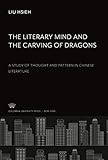The Literary Mind and the Carving of Dragons : A Study of Thought and Pattern in Chinese Literature / Liu Hsieh.
Material type: TextSeries: Records of Civilization. Sources and StudiesPublisher: New York, NY : Columbia University Press, [1959]Copyright date: ©1959Description: 1 online resourceContent type:
TextSeries: Records of Civilization. Sources and StudiesPublisher: New York, NY : Columbia University Press, [1959]Copyright date: ©1959Description: 1 online resourceContent type: - 9780231937429
- 9780231895224
- online - DeGruyter
| Item type | Current library | Call number | URL | Status | Notes | Barcode | |
|---|---|---|---|---|---|---|---|
 eBook
eBook
|
Biblioteca "Angelicum" Pont. Univ. S.Tommaso d'Aquino Nuvola online | online - DeGruyter (Browse shelf(Opens below)) | Online access | Not for loan (Accesso limitato) | Accesso per gli utenti autorizzati / Access for authorized users | (dgr)9780231895224 |
Frontmatter -- Acknowledgments -- Contents -- Introduction -- Preface -- I. On Tao, the Source -- II. Evidence from the Sage -- III. The Classics as Literary Sources -- IV. Emendation of Apocrypha -- V. An Analysis of Sao -- VI. An Exegesis of Poetry -- VII. Musical Poetry (Yüeh-fu) -- VIII. Elucidation of Fu -- IX. Ode and Pronouncement (The Sung and the Tsan) -- X. Sacrificial Prayer and Oath of Agreement (The Chu and the Meng) -- XI. Inscription and Exhortation (The Ming and the Chen) -- XII. Elegy and Stone Inscription (The Lei and the Pei) -- XIII. Lament and Condolence (The Ai and the Tiao) -- XIV. Miscellaneous Writings -- XV. Humor and Enigma (The Hsieh and the Yin) -- XVI. Historical Writings -- XVII. Speculative Writings -- XVIII. Treatise and Discussion (The Lun and the Shuo) -- XIX. Edict and Script (The Chao and the Ts'e) -- XX. War Proclamation and Dispatch (The Hsi and the I) -- XXI. Sacrifices to Heaven and Earth (Feng Shan) -- XXII. Memorial, Part I (The Chang and the Piao) -- XXIII. Memorial, Part II (The Tsou and the Ch'i) -- XXIV. Discussion and Answer (The I and the Tui) -- XXV. Epistolary Writing (The Shu and the Chi) -- XXVI. Spiritual Thought or Imagination (Shen-ssu) -- XXVII. Style and Nature (T'i-hsing) -- XXVIII. The Wind and the Bone (Feng-ku) -- XXIX. Flexible Adaptability to Varying Situations (T'ung-pien ) -- XXX. On Choice of Style -- XXXI. Emotion and Literary Expression -- XXXII. Casting and Cutting, or, on Editing of Ideas and Rhetoric (]ung-ts'ai) -- XXXIII. Musicalness -- XXXIV. Paragraph and Sentence -- XXXV. Linguistic Parallelism -- XXXVI. Metaphor and Allegory (Pi and Hsing) -- XXXVII. Embellishment as Description -- XXXVIII. Factual Allusion and Textual Reference -- XXXIX. Philology and Choice of Words -- XL. The Recondite and the Conspicuous (Yin-hsiu) -- XLI. Literary Flaws -- XLII. The Nourishing of Vitality -- XLIII. Organization (Fu-hui) -- XLIV. Discussion on the Art of Writing (Tsung-shu) -- XLV. Literary Development and Time (Shih-hsu) -- XLVI. The Physical World -- XLVII. Literary Talents -- XLVIII. An Understanding Critic (Chih-Yin) -- XLIX. The Capacity of a Vessel (Ch'eng-ch'i) -- Glossary -- Index
restricted access online access with authorization star
http://purl.org/coar/access_right/c_16ec
Traces the origins of Chinese literature and the impact of nature by looking at Confucius, through the classics, poetry, and the relationship between music and poetry.
Mode of access: Internet via World Wide Web.
In English.
Description based on online resource; title from PDF title page (publisher's Web site, viewed 08. Jul 2019)


